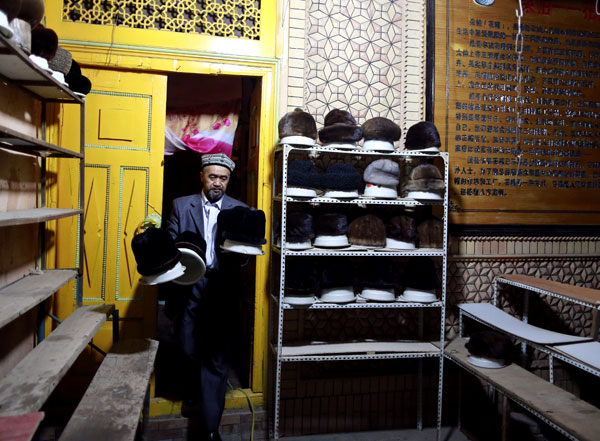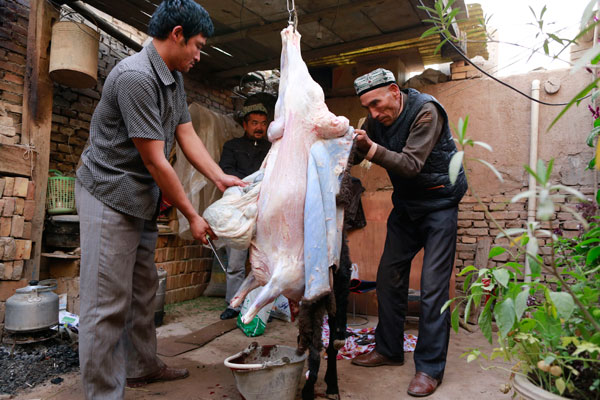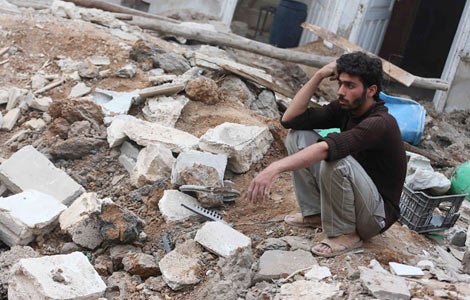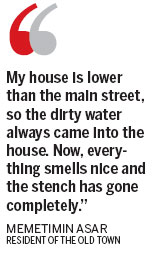Ancient, modern under same roof
Updated: 2013-11-06 07:54
By Cui Jia (China Daily)
|
||||||||
A giant maze
Despite the recent work, visitors are still liable to feel as though they are being sucked into a giant maze when they step into the old town surrounding the biggest mosque in China, the Id Kah. The old streets are being widened to allow access for fire engines and emergency vehicles, but apart from that, they retain their original labyrinthine quality.
 |
|
A hat store back in business after the renovation. |
The yellow blocks of houses, all newly decorated with painted window frames, stand in stark contrast to the rest of Kashgar, which has become increasingly modern since the State Council decided to turn the city into a special economic zone because of its status as an important stop on the ancient and modern Silk Roads.
Some residents have carefully pasted traditional triangular clay tiles over the facades of their houses.
The small brick lanes, with their random branches, lead to many places, including the hat bazaar, where traditional Uygur hat makers spin their goods to remove the dust before displaying them to potential customers, or the mattock bazaar, where the noise of the blacksmiths' electric grinders can be heard all day.
 |
|
Residents skin a sheep to celebrate the Corban Festival. |
Often, this teeming maze of alleys can lead to dead ends, a problem visitors can solve simply by looking carefully under their feet: if the bricks in the path are laid in an arrow formation, the alley will lead to another one. If not, a cul-de-sac lies dead ahead.
Now that the streets have been widened, cars and electric motorcycles have become the most common means of transport in the old town, but some residents still prefer to use carriages drawn by horses with bells hanging from their necks. Although the carriages are banned on Kashgar's main streets, they have long provided a convenient shuttle service between the bazaars and are just as fast as modern methods of transportation.
Many traditional businesses have benefited from the cleaner, more resident-friendly old town. Parhat Tursun, 54, who makes traditional Uygur hats, continues to sell his handmade fur and leather goods in front of his renovated house at the hat bazaar, which has been operating next to Yawag street, meaning "The Road to the Palace" in Uygur, for more than 1,000 years.
The remains of a palace from the Kara-khanid Empire (10-13AD), located near Parhat's house, have been long buried and only the street names such as Yawag remind the locals of the long-gone empire.
"I used to make about 600 yuan a month before the renovation, because no one wanted to come to a dusty, smelly place to shop. Now I can make 3,000 yuan during the summer tourist season alone," said Parhat.
Last year, Chen Tao, 31, a graduate of Fudan University in Shanghai, opened a hostel in the old town with two classmates. The Pamir Youth Hostel, which lies in the shadows of the Id Kah mosque, is one of only three businesses in the heart of the old town run by Han people.
"Travellers often ask me what I think of the renovation project. Well, I believe that as long as the people living in the old town don't change, the flavor and style will remain," he said.
"Some visitors, especially those from overseas, have expressed disappointment at the disappearance of the old wood and dirt houses, but I always tell them that the people have a right to live a modern life, and that Uygur culture revolves around much more than some unstable houses, which could collapse at any time," he said, sitting on the terrace of the hostel and watching the people entering the mosque for daily prayers.
Shao Lifei, 24, an outdoor-team leader from Harbin, the capital of Heilongjiang province, had been in Kashgar for 13 days and was staying at the hostel. "The original features have been retained and the people now live in a safer environment. That's a good thing," he said.
"I am so surprised that I can feel a village atmosphere in the center of a big city," said Benjamin, a Frenchman who was also staying at Chen's hostel.

 US, Russia fail to agree Syria peace talks date
US, Russia fail to agree Syria peace talks date
 India launches exploratory spacecraft to red planet
India launches exploratory spacecraft to red planet
 Taking risks in a firestorm
Taking risks in a firestorm
 Biden to emphasize Asia pivot on tour
Biden to emphasize Asia pivot on tour
 China vows to cooperate in global fight against ivory smuggling
China vows to cooperate in global fight against ivory smuggling
 US mall on lockdown after shots heard
US mall on lockdown after shots heard
 Blackhawks honored at White House
Blackhawks honored at White House
 Kerry denies tensions between US, Saudi Arabia
Kerry denies tensions between US, Saudi Arabia
Most Viewed
Editor's Picks

|

|

|

|

|

|
Today's Top News
China seeks collaborative efforts on nuclear safety
Alipay partners with UATP
Govt to focus on better service
Canadian province closes debt issue in HK
US media under attack for 'double standards' on terror
Biden to emphasize Asia pivot
Cyber minister proposes security fix
Franchisors look to follow KFC’s lead
US Weekly

|

|








